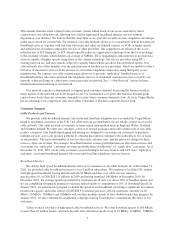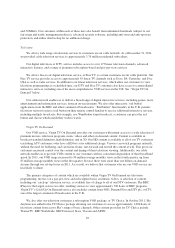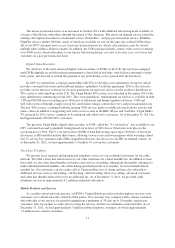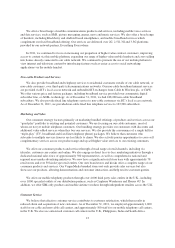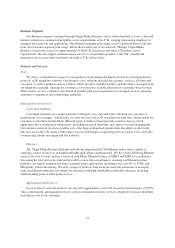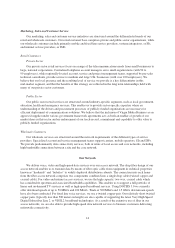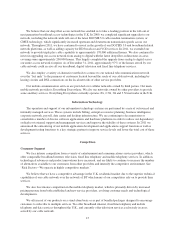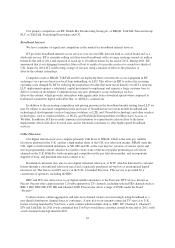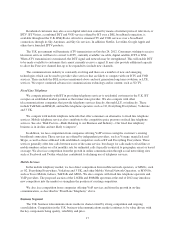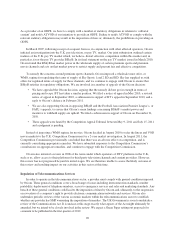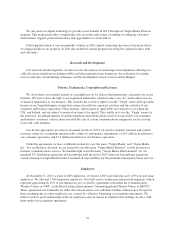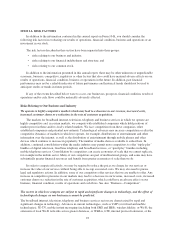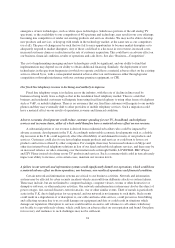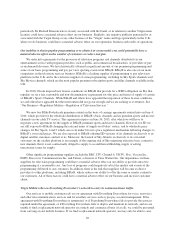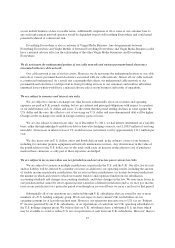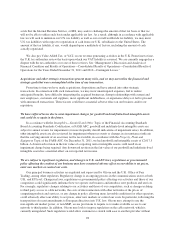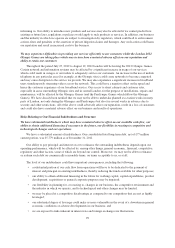Virgin Media 2011 Annual Report Download - page 20
Download and view the complete annual report
Please find page 20 of the 2011 Virgin Media annual report below. You can navigate through the pages in the report by either clicking on the pages listed below, or by using the keyword search tool below to find specific information within the annual report.The European Framework was amended by Directives 2009/140/EC and 2009/136/EC, and changes have
been made to the Communications Act 2003 and the Wireless Telegraphy Act 2006 to implement these
amendments in the United Kingdom.
We are also subject to regulation under the U.K. Broadcasting Acts 1990 and 1996 and other U.K. statutes
and subordinate legislation, including the Competition Act 1998 and the Enterprise Act 2002. On-demand
programming is regulated by the Authority for Television On-Demand, or ATVOD, under a co-regulatory regime
with the U.K. Office of Communications, or Ofcom. The regulatory regime for on-demand programming is
derived from the Audiovisual Media Services Directive.
U.K. Regulatory Authorities
Ofcom is the key regulatory authority for the communications sector in which we operate. It is responsible
for furthering the interests of consumers by promoting competition. In particular, Ofcom is responsible for
regulating the behavior of providers of electronic communications networks or services that have significant
market power, or SMP, in identified markets which may have a harmful influence on competition and consumers.
A provider is deemed to have SMP if it has a position of economic strength affording it the power to act
independently of competitors and customers within a given market. The U.K. Office of Fair Trading also has
jurisdiction with respect to competition matters.
Broadband Expansion
The government has decided not to implement the broadband tax proposed by the previous government. It
proposes instead to drive the deployment of superfast broadband and the provision of basic broadband to 90% of
the U.K. using money from the publicly funded BBC License Fee, under-spend from the Digital TV Switch Off
Project and private investment. Two key projects have been announced: the Broadband Delivery Program, which
is focused on delivering broadband to areas that the market will not serve of its own accord (mainly rural areas);
and the Urban Broadband Fund, which is aimed at establishing ‘super connected’ cities with fixed broadband
capabilities of between 80-100 Mbit/s and comprehensive mobile broadband coverage. We are playing an active
role in helping Government and industry understand how best this money might be spent to maximize the long
term value of public investment in broadband networks, and to ensure the money is allocated in a way that does
not undermine private investments or otherwise distort the market. This includes ensuring that state aid rules are
strictly adhered to.
In the context of the Broadband Delivery Program, Fujitsu has signaled its intent to secure government
funding to build a fiber optic broadband network in rural areas using BT’s poles and ducts. Should Fujitsu secure
the necessary funds and complete its build we have indicated our intention to seek to negotiate appropriate
wholesale access terms on an anchor tenant basis, with the intention of accessing customers outside of our cable
network.
Regulation of Television and Video On Demand Services
We are required to hold individual licenses under the Broadcasting Acts 1990 and 1996 for any television
channels (including barker channels) which we own or operate and for the provision of certain other services on
our cable TV platform, such as electronic program guides. These television licensable content service, or TLCS,
licenses are granted and administered by Ofcom. Under these licenses, each covered service must comply with a
number of Ofcom codes, including the Broadcasting Code, and with all directions issued by Ofcom. Breach of
any of the terms of a TLCS license may result in the imposition of fines on the license holder and, ultimately, to
the license being revoked.
ATVOD is the independent co-regulator for the editorial content of U.K. video on demand services that fall
within the statutory definition under the Communications Act of an “On Demand Programme Service”, or ODPS.
19


